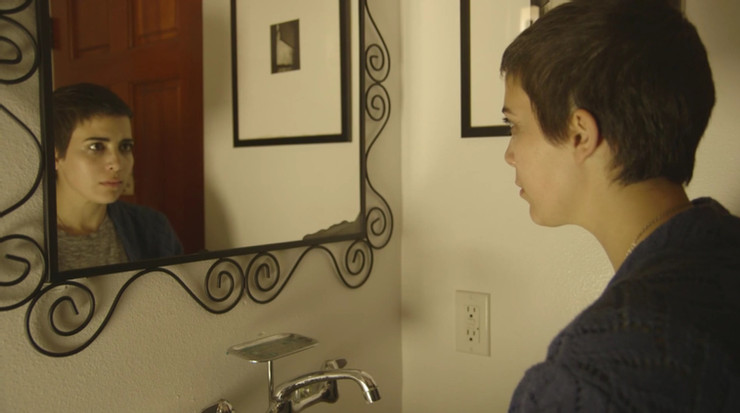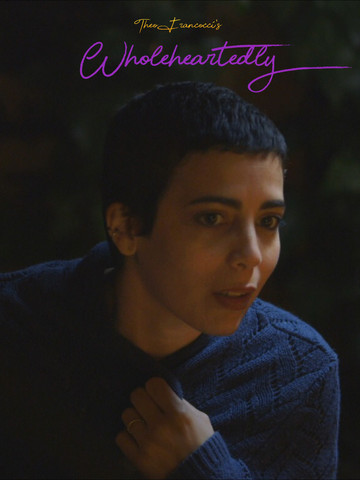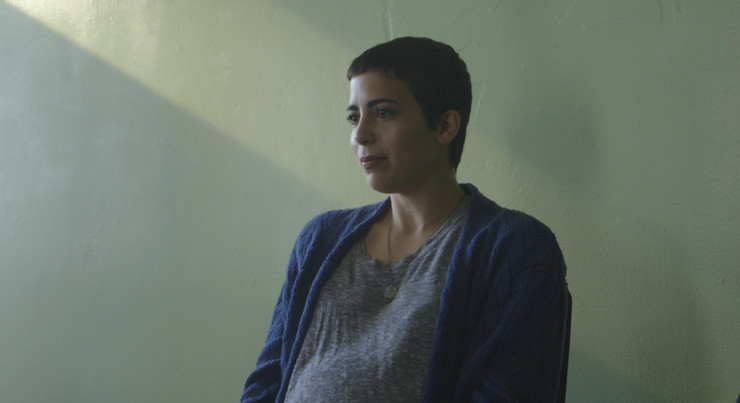Today we are interviewing Theo Francocci, the director of ‘Wholeheartedly.’ Theo was born on November 8th, 1988, in Roma, Italy. He started his career working for Radio Podcasts and Independent Music Productions. Theo moved to London in 2010 to study Sound Engineering. In 2011 he started working in the Film and TV industry. He is known for his work on Arctic Dogs (2019), Bent (2018), WAX: We Are the X (2015), and Black Butterfly (2017).
‘Wholeheartedly’ is a poignant tale of despair. However, there is something innocent, something beautiful in every frame of the movie. Carmen represents every alienated human. Her gloom is as real as her perseverance, her resilience against all the odds. Carmen must live to see another day.
BCIFF: First of all, let me congratulate you, sir, for making a beautiful yet haunting movie with a plethora of narratives, narrated beautifully in so little time.
The first question that we would like to ask you is:
Why ‘Wholeheartedly’? We would like to know the story behind the title.
THEO: That’s an excellent story. Initially, the title was supposed to be “Carmen,” some reference to Merimee’s character. However, the two characters were so different that I decided to change the title. “Wholeheartedly” was a song that I wrote during summertime, and that became part of the soundtrack of the film in both English version and Spanish (End title song with the title “De Todo Corazon”). The song is about loving with all the heart, and that’s what Carmen does for the whole film – she loves her daughter so much that she stops drinking and tries to build a better future. Throughout the film, Carmen gains the strength to separate from her unhealthy relationship, and she learns to love herself, and there’s only one way to love ourselves: “Wholeheartedly.”
BCIFF: What is the story behind Carmen’s story, something that made Theo Francocci consider the problem of a lonely Carmen ‘Wholeheartedly?’
THEO: When I first moved to Los Angeles, I heard stories of immigration and alcoholism, many times connected. I felt emotionally connected with people who dream of a better life and struggle for it, so I started my research. Eventually, the character was inspired by one of the strongest women in my life – my sister. She managed to build her career and future being a single mother, and that’s the kind of message that I wanted to send to the audience. No matter what situation you are in in your life, there’s a way to turn it better, and the strength is inside you.
BCIFF: In the movie, we see a number of ‘good’ American citizens. The one who gives her a lift, the policeman, for example. Is there a dialectical innuendo behind the portrayal of the characters mentioned above to shatter the convention of assumptions restricted by binaries.
THEO: If I want to break the stereotypes? Totally. Never judge a book by its cover! Many people can be charming and polite initially and then reveal to be awful people, exactly how someone who could seem weird or intimidating can hide a beautiful personality. I believe in humanity, and I know that many stereotypes of Americans can be misleading. There are many great people out there who are willing to help without asking anything in exchange. In my opinion, here there’s a message of positivity and hope for future generations – Doesn’t cost anything to be kind.
BCIFF: I was fascinated by the recurrent mirror scene. Does it indicate the past, the burden of trauma that still plagued the psyche of Carmen?

THEO: I’ve always been attracted to the mirror as an element and symbol. Mirrors have the power to induce haunting self-reflection and internal introspective analysis. Carmen is forced to face her biggest fear – herself. When in contact with her future, Carmen has to visualize a better version of herself, whereas when she looks at her past, she has to accept her past trauma and find the right words to talk to her daughter. Overall, the mirror element causes self-confrontation, research of profound truth, and the discovery of ourselves.
BCIFF: ‘Wholeheartedly’ follows a non-linear narrative. Is there a particular reason behind it?
THEO: Definitely. The structure aims at the idea of circularity. The beginning and the end, Carmen’s past and future connect in an emotional loop. In order to understand the first scene, the audience has to reach the end of the film and vice-versa. I always had a passion for intriguing structures and plot twists, and I couldn’t wait to put those techniques in practice.
BCIFF: Who were the filmmakers you admired growing up? What were your favorite films?
THEO: I grew up amidst Walt Disney Classics like The Lion King and Hercules, which played a fundamental role in my storytelling sensitivity. When talking about dark stylistic, I cannot mention the master Tim Burton who taught me the importance of lines and shadows. I admired Stanley Kubrick for his perfect visual storytelling, Alfred Hitchcock, for the emotional suspense. Let me also mention Steven Spielberg, Nancy Meyers. Allow me to name masterpieces like Memento, the Matrix, and Fight Club for their fantastic narrative structure. Some of my favorite films are: Darren Aronofsky’s Black Swan, Ridley Scott’s Gladiator, Kathryn Bigelow’s Zero Dark Thirty, Christopher Nolan’s The Dark Knight, Jean-Pierre Jeunet’s Amelie, Andrew Stenton’s Wall-E, and Roberto Benigni’s Life is Beautiful.
BCIFF: There is another interesting scene in the movie, the interaction between Carmen and her mother. What role does patriarchy play in conversations like these? Carmen’s mother cautions her about her lack of alternatives. She normalizes Carmen’s violent/ failed marriage, her husband’s infidelity.
THEO: The idea here is to create awareness of how certain cultures are strongly connected to patriarchy and sexism. I’ve found it very interesting to discover how the family’s traditional concept in Italy and Mexico is similar. I’ve been raised by a very conventional, but at the same time, modern family, and I was lucky enough to grow up in a family that was free from concepts like the gender binary, misogyny, heterosexism, white supremacy, or capitalism. When my sister broke up with her partner, my family welcomed her back without making her feel ashamed of her decision. They always supported her drive towards a career in the sciences. However, many people are not so lucky, and they have to face not only the battles of everyday life, but they also struggle to have the support they need from the family.

BCIFF: The scenes were beautifully shot. There was color, and there was darkness. Tell us if you did that consciously, balancing the glee in one’s life against his agony.
THEO: I firmly believe that the interaction between the director and the director of photography is essential. I had many conversations with my DP, Guadalupe Hernandez Pineda, and together we studied the film shot by shot, defining the mood, style, and tone we wanted for every scene. The goal was to follow the emotions of the characters visually. For instance, when Carmen tells her story at the AA meeting, she knows that she is in a safe environment, and the light is bright and diffused, but the more we move towards the end, the more everything gets darker. My advice for every writer/director is: know your vision and team up with people who are on the same wavelength and share your ideas and style. Communication and being on the same page with your crew is the key to success.
BCIFF: Tell us something about the green card situation in the US. Marriage becomes very political in a situation like this. Something similar was depicted in ‘Our Children’ by Joachim Lafosse.
THEO: Lafosse did a great job describing the feelings and internal struggle of the protagonist; likewise, I wanted to center the story around the emotions of the characters and the dynamics of the couple. It’s always hard to understand when we are living in an unhealthy relationship. When Robert falls into his dark spiral, we see how other elements – like immigration – play a dramatic role in the couple’s behavior. Robert thinks that Carmen is with him only for the Green Card, whereas Carmen is undoubtedly in love, but Robert’s behavior now jeopardizes her future. My intention is to send questions to the audience – Could the immigration issue be a threat to a relationship? Could you fake to be in a relationship to secure yourself and your family a better future? Stories like Carmen’s are real, and they are all around us, but they are not easy to understand.
BCIFF: At the end of the day, ‘Wholeheartedly’ is about hope, the frail yet resolute spirit of man. How much hopeful are you about the immigration crisis in the USA? It is a serious problem all around the world. Do you see a time in the future our world would not be ‘broken up into fragments by narrow domestic walls’ as Tagore believed?

THEO: “Wholeheartedly” is definitely about hope. At the end of the film, Carmen has changed. She finally believes in herself and her possibilities. She finds the strength necessary to embrace her condition and to twist it positively. That’s the kind of approach I believe is essential for any crisis – even the immigration one. I think a world without borders is possible but feels more like a utopia for now. My wish is to see a world more” human” and emotionally understanding of different situations. In the USA, a country that roots its origins on the famous melting pot, I’ve found immigration still an issue. Yet, I also witnessed the concern many people have towards respect and solidarity to the others, no matter how different they are from us. Respect yourself and respect everyone you meet the way you would like them to respect you.














